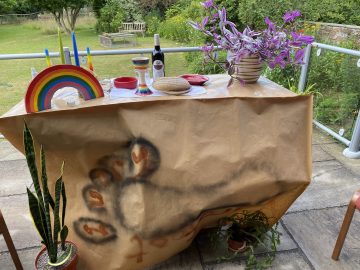A Thought to Share
This category was formerly called “Thought for the Month”

Rev Sheila Cameron’s sermon on 2 October pulled together another difficult gospel (Luke 17:5–10) with passages from Habakkuk (1:1–4, 2:1–4) and Paul’s second letter to Timothy (1:1–14). Here is an extract …
Habakkuk stands at his post, ever the faithful servant, waiting for God to intervene. Then suddenly there is a reply, and God tells Habakkuk that his vision is limited – he isn’t seeing the whole picture. The tyrants who seem to be in control aren’t really; the prophet needs to look more closely at the controllers and see that things are not exactly right with them. He needs to see the big picture, not just what is happening in his own narrow field of vision.
Habakkuk is commanded to write this message on a hoarding big enough so that even someone running past it can read it. The proclamation is to be patient and to wait for God to act, a God who is never deaf to a cry for help, although no precise time can be expected for this to be fulfilled. And how familiar is this? So often we ask God for something desperately important to us, certain that it must happen now; we ask again and again because we want an answer right away. But prayer is answered in God’s time, not in ours, and astonishingly enough, when we view the scenario retrospectively, we can see that our heartfelt, genuine prayer has been answered if not exactly to the letter, at least in the way that is best for us. This is the life of faith and patient faithfulness that we are called to.
Do read the whole of Sheila’s sermon at this link.
Photo by Joshua Lanzarini on Unsplash.

Rev Sheila Cameron’s Harvest sermon ended with thoughts on our reading from the final chapter of Paul’s First Letter to Timothy (1 Timothy 6:6–19) …
We do, of course, have basic needs for food and clothing, and Paul (v.8) acknowledges that, but the danger lies in our tendency to pursue the unnecessary. A.K.M. Adam remarks that there is “a transition from basic food and clothing to nice food and clothing, and from there to stylish clothing and rich food [that] takes place gradually.” And there, of course, lie the pitfalls: the competitiveness, the envy, the getting into debt, the descent into dishonesty. “The love of money,” writes Paul, “is the root of all kinds of evil” (v.10).
In contrast to the worldly discontent that leads us astray so very easily, Paul writes of another way, a way that recognizes the uniqueness and transcendence of God. God is “the only Sovereign, the King of kings and Lord of lords”, the one who “has immortality and dwells in unapproachable light” (v.15). This God provides for us richly “with everything for our enjoyment” – and we acknowledge this especially in the harvest season. The Christian life is far from dull, but on the contrary full of all the interest and stimulation, adventure, refreshment and comfort we need. In Christ, we are invited to “take hold of the life that really is life” (v.19).
Living in the light of the Resurrection, wherever we go, whatever the changing circumstances of our lives, we know we will encounter the living presence and the love of Christ. So let us set your hope on him and “take hold of the life that really is life.” Amen.
Read the whole of Sheila’s sermon at this link.
The picture by Frans Francken “Christian deeds of mercy” comes from the collection of the National Museum in Warsaw, and is used via Wikimedia Commons.

Jesus visits Martha and Mary (Luke 10:38–42)
Now as they went on their way, he entered a certain village, where a woman named Martha welcomed him into her home. She had a sister named Mary, who sat at the Lord’s feet and listened to what he was saying. But Martha was distracted by her many tasks; so she came to him and asked, “Lord, do you not care that my sister has left me to do all the work by myself? Tell her then to help me.” But the Lord answered her, “Martha, Martha, you are worried and distracted by many things; there is need of only one thing. Mary has chosen the better part, which will not be taken away from her.”
Which is the better part?
For years interpretation has sought
to divide Martha and Mary
determining that only one of them
can be commended by our Lord
that only one way
is important in the kingdom.
Yet truth be told
we know all too well
that we need those who welcome others
doing all the things necessary
to provide hospitality
as well as those
who will take time to listen,
affording intimacy.
And in both women
we see the norms of the day
confounded yet again
turned on their head
by women refusing to conform.
Martha, welcoming Jesus boldly
as a head of a household might.
And Mary, sitting at the Rabbi’s feet
as a disciple might.
Both, in their own way contributing
to the table fellowship they shared.
And, we can imagine Jesus
taking the fruits of Martha’s labour:
bread still warm from the oven
its aroma filling the room
and sweet, heady wine,
kept for just such an occasion
and, wrapped in the adoring gaze of Mary,
transforming those gifts
in the knowledge
that the portent of death
was not missed in this home
For here were two women
who simply got it
and, together, made room for the One
in whom everything made sense
Two women who demonstrated that love
does not consist in either/or
but in both/and.
Martha and Mary
who recognised
that the kingdom was near.
Thanks to our good friend Liz Crumlish for allowing us to re-post her blog.